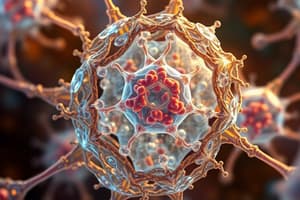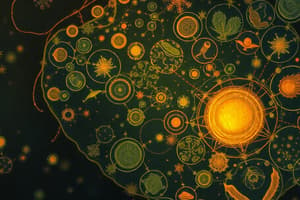Podcast
Questions and Answers
What is the structural and functional unit of life?
What is the structural and functional unit of life?
cell
What ability allows an organism to maintain a constant internal state?
What ability allows an organism to maintain a constant internal state?
homeostasis
Which of the following is NOT a general function of the cell?
Which of the following is NOT a general function of the cell?
- Homeostasis
- Acquisition and Utilization of Energy
- Movement to different locations (correct)
- Responsiveness to Their Environment
Cells are larger than bricks.
Cells are larger than bricks.
Name one condition that cells require to function normally.
Name one condition that cells require to function normally.
What is needed by various cells to perform their functions?
What is needed by various cells to perform their functions?
The ability of an organism to respond to changes in their environment is called ______.
The ability of an organism to respond to changes in their environment is called ______.
Flashcards are hidden until you start studying
Study Notes
Cell Theory
- Cells are essential as they act like building blocks in the structure and function of life.
- Pioneering scientists contributed to the development of cell theory, highlighting the significance of cells in living organisms.
Learning Outcomes
- Understand and explain the postulates of the cell theory.
- Describe general cell features and their functions.
- Create a timeline detailing the discovery of the cell.
- Identify the key scientists behind cell theory and analyze its foundational principles.
Overview of Cells
- Cells are notably small; their size is closely linked to their functional efficiency.
- Small cell size aids in rapid transport of materials and efficient metabolic processes.
Functions of Cells
- Homeostasis: Cells regulate their internal environment to maintain a stable, constant state crucial for survival.
- Acquisition and Utilization of Energy: Cells obtain energy from food molecules, converting it into forms usable for various cellular activities.
- Responsiveness to Environment: Cells react to stimuli in their environment, allowing them to adapt and maintain internal balance.
- Protection and Support: Cells provide structural integrity and protection, essential for organism functionality.
Energy Functions
- Energy is stored in chemical bonds of food molecules and used by cells for diverse functions:
- Heart cells pump blood, responding to energy needs.
- Intestinal cells break down food.
- Skeletal cells enable movement.
- Nerve cells transmit information.
Responsiveness
- Cells must detect environmental changes to generate appropriate responses and preserve homeostasis.
- Example: Increased melanin production in the skin in response to UV radiation enhances protection against DNA damage.
Importance of Homeostasis
- Maintaining homeostasis is critical as most cells require specific conditions to function effectively.
- Mechanisms like perspiration and shivering are examples of how the body regulates temperature to support cellular functions.
Studying That Suits You
Use AI to generate personalized quizzes and flashcards to suit your learning preferences.




